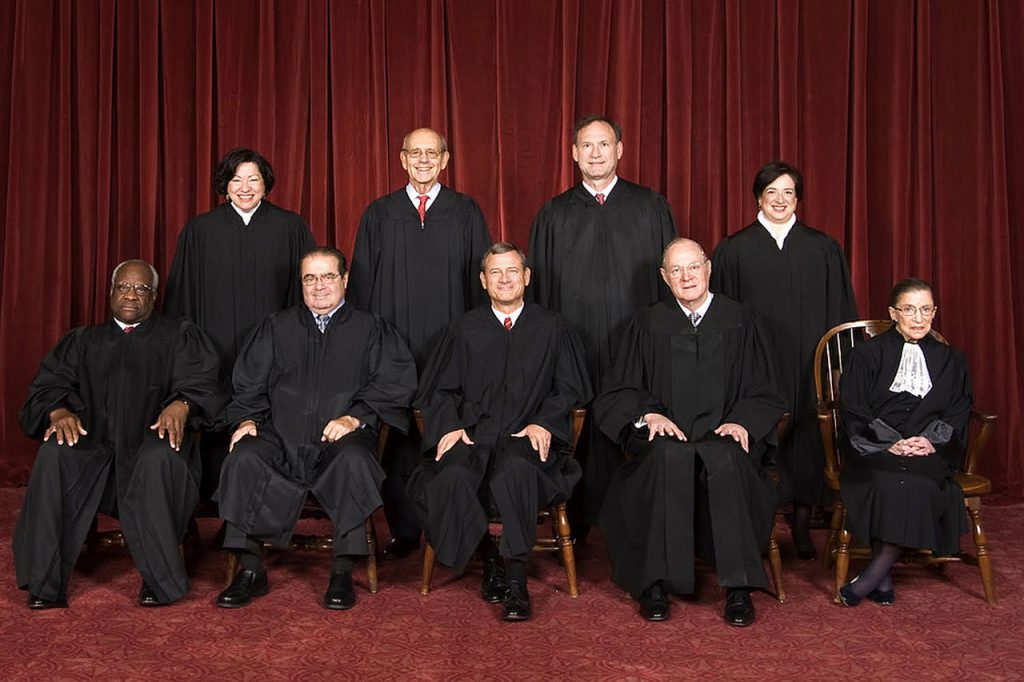The next election won’t just decide the future of reproductive rights, it will decide if the 20th century can be repealed

Abigail Fisher was denied admission to the University of Texas, a school that’s more selective than Harvard, because her academic record wasn’t good enough.
She sued because a handful of minority students along with 42 white students were granted special admission and she wasn’t. Now she wants to help end any programs that seek to increase diversity are ended in public institutions. And she may well win.
When news broke that Justice Antonin Scalia had wondered aloud during the arguments if black students would be better served at “less advanced schools” — a question he didn’t pose about Abigail Fisher — the great Connie Schultz tweeted:
This is your kindly campaign reminder that the President of the United States nominates Supreme Court justices. https://t.co/ZDAnxtTAm9
— Connie Schultz (@ConnieSchultz) December 9, 2015
One decent ruling on same-sex marriage and a refusal to throw out a generations of jurisprudence to throw out Obamacare have blinded many to seeing how conservative our Supreme Court has become. This is likely the most Conservative Court in a half century and could easily become the most conservative Court in a century if a Republican wins in 2016.
Let me remind you of the underwear-stain inducing math:
On January 20, 2017, when the 45th President of the United States is sworn in, three of the nine sitting justices—Antonin Scalia and Anthony Kennedy and the Notorious Ruth Bader Ginsburg—will be more than 80 years old. Stephen Breyer will be 78 and a half , just a few months shy of 78.7, the court’s average retirement age since the early seventies, just after Dick Nixon ended the court’s progressive majority.
The next president could be the first since Nixon to appoint four justices, possibly in one term.
This dire situation quickly brings to mind Roe v. Wade and the right to organize for public workers, but what conservatives have in mind for the Court is far more extreme than a simple erosion of basic rights.
E.J. Dionne’s great new book Why the Right Went Wrong makes an argument that should reshape we see politics. While Ronald Reagan was successful in changing the way people talk about government, the actual changes he made to government were marginal and entirely unsatisfactory to the libertarian billionaires who finance the conservative movement.
Reagan didn’t get rid of Social Security, Medicare and Medicaid. He made a deal to extend the life of Social Security, gave up his opposition to Medicare and actually expanded Medicaid. The cuts he made to government were marginal, mostly affecting the most vulnerable Americans who tend not to vote. And any cuts were dwarfed by Reagan’s expansive military spending.
Even Obamacare is proving tougher to get rid of than Republicans imagined. The recent governors’ elections saw Democrats lose in Kentucky, the one red state where health reform has been allowed to take hold and thus has had the greatest reduction of the uninsured in the nation. But the net result may be more people on Obamacare.
Democrats also won Louisiana on the promise of expanding Medicaid and Kentucky’s Republican governor seems to be veering toward privatizing Medicaid expansion, rather than dumping it.
If conservatives are ever going to rid themselves of wildly popular public benefits, they can’t do it themselves.
They need the Court to do it.
In 2012, Sahil Kapur spoke to conservative scholars about would a Romney Supreme Court would look like.
The most telling point, “The ACA decision revealed that there are already four votes on the Court to prevent the Taxing Clause from being used to promote regulatory goals.” Some conservative scholars believe with just one more vote, they could begin to unwind the jurisprudence that has been used to justify Medicare and Social Security. Eventually even child labor laws and the minimum wage could be subject to the same legal claims the right made as we climbed out of the Gilded Age.
That’s an extreme legal view and would require the appointment of an ideologue to make it happen. But given that the next president could get four chances to put such an ideologue on the bench, it’s a far rosier prospect than ever expecting a candidate to run and win and win again on gutting America’s favorite government programs.



